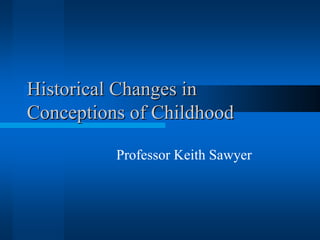
313 history lecture
- 1. Historical Changes in Conceptions of Childhood Professor Keith Sawyer
- 2. Philippe Aries “In medieval society the idea of childhood did not exist….[the] awareness of the particular nature of childhood, that particular nature which distinguishes the child from the adult.” 1962 (1960), Centuries of Childhood, p. 128
- 3. Aries’ Evidence In medieval art, children are rarely present When they are, they are represented like miniature adults Society shifted from extended families to nuclear families Age-graded schools were founded and spread
- 4. Stages of the Construction of Childhood 13th century: paintings contained putti, naked children, indicating the beginning of an interest in childhood
- 5. Stages of the Construction of Childhood 16th century: the coddling period. Childhood was seen as a time of innocence 16th-18th centuries: the moralistic period
- 6. Children Lost Out... Aries thought that due to this history, the modern world is “obsessed by the physical, moral, and sexual problems of childhood” The child was removed from adult society; this “deprived the child of the freedom he had hitherto enjoyed among adults. It inflicted on him the birch, the prison cell”
- 7. Or did they? Other scholars have argued that historical changes made things better for children. deMause (1974): conceptions of childhood result from parents working out their own anxieties in their interactions with children “The further back in history one goes, the lower the level of child care, and the more likely children are to be killed, abandoned, beaten, terrorized, and sexually abused”
- 8. Evidence from Direct Sources Linda Pollock: studied diaries, autobiographies, and newspaper accounts of child abuse court cases 500 diaries and related sources were examined Pollock claimed this gives a much more positive picture of childhood in the past Pollock claimed there was little support for Aries or deMause
- 9. The Twentieth Century “The century of the child” Progressive educators and reformers. The goal: to “educate the public” and continue the “progress of humanity”
- 10. Experts in 1900 Dr. L. Emmett Holt. His manual: The care and feeding of children. The stern one. Dr. G. Stanley Hall. Taught mothers and teachers to study children and collect data. For the first time, scientists began to replace mothers and ministers
- 11. Gender Issues Childhood was a woman’s domain: the “helpmeet” role Men were the “breadwinners” Scientists were all male When science turned to children, men entered a traditionally female sphere
- 12. Two Perspectives on Child- Rearing Dr. Holt: the parent-centered approach, focused on rational discipline and self control. Dr. Hall: the child-centered approach, focusing on the child’s natural impulses and imagination.
- 13. G. Stanley Hall Highly introspective, telling inspirational stories about his own childhood A Congregationalist from Massachusetts Focused on “new education” An early American admirer of Freud
- 14. L. Emmett Holt Born in 1855 on a New England farm Devoutly religious Diet was critical. Breastfeeding was unsanitary and unsystematic, unpredictable His expertise was digestion and cow-milk formula He founded a school for private nursery maids
- 15. What’s a Parent to Do? Holt and Hall seem total opposites Holt emphasizing authority and structure, Hall emphasizing intimacy and child- centered pedagogy
- 16. The New History of Childhood Children are considered active agents Scholars study interactions between parents and children, not only adult’s conceptions of children
- 17. A Focus on Peer Culture Children do not develop only as individuals; they collectively create peer cultures, and they contribute to the reproduction of society Example of interpretive reproduction: the “newsies”
